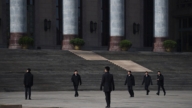【新唐人2014年07月30日讯】总部位于美国的跨国电脑科技公司“微软”,在北京、上海、广州、成都的办公室,7月28号遭到中共国家工商总局的突击调查,29号,工商总局宣布,已对“微软公司”所谓“涉嫌垄断”行为立案调查。分析指出,杜绝企业垄断,应针对央企进行调查,中共企图让国际大公司听命于它,而使用各种威胁利诱手段。
据大陆《新浪科技》网站报导,28号上午,有大批工商总局人员进入“微软”位于北京、上海、广州、成都等四地分公司办公室,他们查封资料、扣押2台电脑,并向“微软”员工进行问话。
28号晚间,“微软中国”内部人士向《新浪科技》透露,这一次突击调查,是因为有人向工商总局投诉,“微软”违反了中国《反垄断法》。这位人士表示,工商总局工作人员并没有透露更多信息,也没有说明投诉者是谁。
“微软中国”随后在一份简短声明中表示,会积极配合政府部门的调查。
29号,工商总局宣布,已对“微软公司”涉嫌垄断行为立案调查。
旅美中国社会问题研究人士张健:“微软公司被中国政府下令彻查的话,就是非常奇怪的事情,因为微软对于全世界互联网的帮助是有目共睹的。中国政府如果想清查的话,首先应该清查在中国大量充斥着盗版的微软软件,保护知识产权。”
业界人士判断,“微软”很可能遭到“滥用市场地位”的相关垄断指控。据了解,今年4月,“微软”不再为“XP操作系统”提供技术支持,导致大陆近2亿台电脑面临安全风险,当时就有专家指出,“微软”违反了《反垄断法》的规定。
大陆企业顾问何军樵:“它的垄断行为还能比的过咱们的央企?能比的过中石化?还是能比的过中石油?还是能比的过中国电信?中国移动?我们的所谓世界500强企业,有几家不是垄断企业?所谓的反垄断调查,可能只是一个借口,应该更有可能是涉及到它所谓的安全问题。”
5月16号,中共当局规定,政府机关在采购招标中,针对所有电脑类产品,不准安装“Windows 8作业系统”。外界指出,这项禁令与“Win8”不利国家资讯安全有关,“Win 8”允许用户透过云端共用内容,不仅容易导致政府资讯外泄,“微软”对“Win 8”的控制力增强,也让中共官方担忧“难以管控内容”。
“微软”是最新一家遭遇反垄断调查的外资企业。在此之前,中共国家发改委曾针对世界上最大的手机芯片制造商“高通公司”发起反垄断调查,“高通”被指控滥用市场支配地位非法牟利,而面临超过10亿美元的罚款。
旅居美国的中国社会问题研究人士张健指出,中共对“微软公司”的查处,和去年对“苹果公司”的批判如出一辙。
张健:“中共对大公司下手,不外乎几个原因,第一,让这些公司作为它的代言人,做它的帮凶,第二,让这些公司通过它在本国的影响力,在国际舞台上,继续在幕后,从各个方面对中共政权进行支持,第三,用各种威胁利诱的手法,来绑架这些大公司,让这些大公司在中国听命于中共的调遣。”
去年3月,中共喉舌《央视》曾点名批评“苹果公司”,《人民日报》也连续3天指责“苹果公司”的售后服务实施所谓“中外双重标准”。3月27号,《人民日报》更发表时评,批评“苹果”。几天后,“苹果公司”主动删除了“经典书”软件,据了解,这款软件可以让大陆读者看到被中共当局禁止的10本书。
去年7月,“苹果公司”从应用程式发布平台“App Store”,移除手机翻墙软件“Open Door”。11月,“苹果”再次顺从中共当局的要求,针对大陆用户移除了“自由微博”(FreeWeibo)。
“微软公司被调查”一事引发热烈讨论。有网友说,“国企笑了”,也有网友说,“全球最大的盗版市场,是哪来的这么大底气查人家”,还有网友说,“高通,微软相继被调查,下一个是谁?”
采访/田净 编辑/陈洁 后制/舒灿
China Conducts Anti-Trust Investigation Against Microsoft
Microsoft offices in Beijing, Shanghai, Guangzhou
and Chengdu were raided by China’s State Administration
for Industry and Commerce (SAIC) on July 28.
On July 29 SAIC announced its investigation
against Microsoft for alleged monopolistic practices.
Analysts pointed out that to prevent monopolistic practices,
the regime should have probed into its state-owned
enterprises instead.
But to force major international firms to follow its orders,
the Communist regime has used various approaches
such as coercion and temptations.
According to Sina Technology Website, a large number
of SAIC agents entered Microsoft’s offices located in Beijing,
Shanghai, Guangzhou and Chengdu on the morning
of July 28.
In addition to taking away various documents and two
computers, they also questioned Microsoft’s employees.
On the evening of July 28, Microsoft China’s personnel
revealed to Sina Technology Website that the sudden
and unannounced investigation this time was because
someone complained to SAIC that Microsoft was in violation
of China’s Anti-monopoly Law.
The source also said that SAIC agents did not disclose any
further information, nor explain who the complainant was.
Shortly afterward, in a brief statement Microsoft China
expressed that it would fully cooperate with the investigation
conducted by the authorities.
On July 29, SAIC announced that it has conducted an
investigation against Microsoft for its monopolistic practices.
Chinese social problem researcher Zhang Jian: “It is very
strange to conduct this thorough investigation against
Microsoft, as Microsoft’s contribution to the Internet
around the world is obvious.
If the regime really wants to do something, it should first
investigate its markets fraught with pirated Microsoft
software, so as to protect intellectual property rights."
People in the industry believe that Microsoft is very likely
to be accused on the charge of “abuse of dominant market
position" and other monopoly-related charges.
It was reported that Microsoft has no longer provided
technical support for its XP operating system since April
this year, leading to nearly 200 million computers in China
facing security risks.
Some experts pointed out at the time that Microsoft violated
the provision of China’s Anti-monopoly Law.
Chinese business consultant He Junqiao: “In terms
of monopolistic practices, China’s state-owned enterprises,
such as China National Petroleum Corporation,
China Telecom, China Mobile, have no rivals.
Among the so-called Fortune 500 businesses in China,
how many of them are not a monopoly enterprise?
The alleged antitrust investigation may simply be an excuse,
and it is very likely that the case is related to the so-called
security issues."
On May 16, the Chinese authorities ordered that Windows 8
operating system was not allowed to be installed
in all computer products among government procurement
bids.
It is believed that the ban has something to do with the fact
that Win8 is not good for China’s national information security.
Win 8 allows users to share information with others through
cloud.
Not only can it result in the leakage of government
information, but Microsoft’s greater control over its Win 8
also lead to Chinese officials’ worries about the “difficulties
in controlling information."
Microsoft is the latest foreign-funded enterprise that
encountered antitrust investigation.
Prior to that, the National Development
and Reform Commission have conducted an antitrust
investigation against the world’s largest mobile phone
chip maker, Qualcomm Incorporated.
Qualcomm was being accused of abusing of its market
dominance for illegal profits, and faced more
than one billion U.S. dollars of fines.
Zhang Jian pointed out that China’s investigation against
Microsoft is the same as its punishment against Apple last year.
Zhang Jian, “The reasons why China investigates
these major companies are nothing more than to
make these companies become its spokespersons
and accomplices;
Second, make these companies support China behind
the scenes of the international arena through their influence
in their own countries;
Thirdly, kidnap these big companies with a variety of threats
and inducements, so that they listen to China’s orders
when they are in China."
In March 2013, state media CCTV has criticized the Apple,
People’s Daily also accused Apple’s after-sale services has
different standard in China’ for 3 consecutive days.
On March 27, People’s Daily even posted an article
to criticize Apple.
A few days later, Apple took the initiative to delete
the ‘Classic Book’ app which allows Chinese readers
to see the ten books forbidden by China.
In July 2013, Apple removed the ‘Open Door’ from its
app release platform, ‘App Store.’
It is a software that breaks Internet blocks on mobile phone.
In November, Apple followed CCP’s order again,
and removed the free Weibo service for mainland users.
The investigation against Microsoft had caused a heated
discussion.
Some netizens wrote, ‘China Enterprises are smiling.’
Some other netizens stated, ‘Where did the world’s largest
piracy market get its courage to investigate Apple?’
There are also netizens questioned, ‘After Qualcomm
and Microsoft being investigated, who will be the next?’
Interview/TianJin Edit/ChenJie Post-Production/ShuCan

























